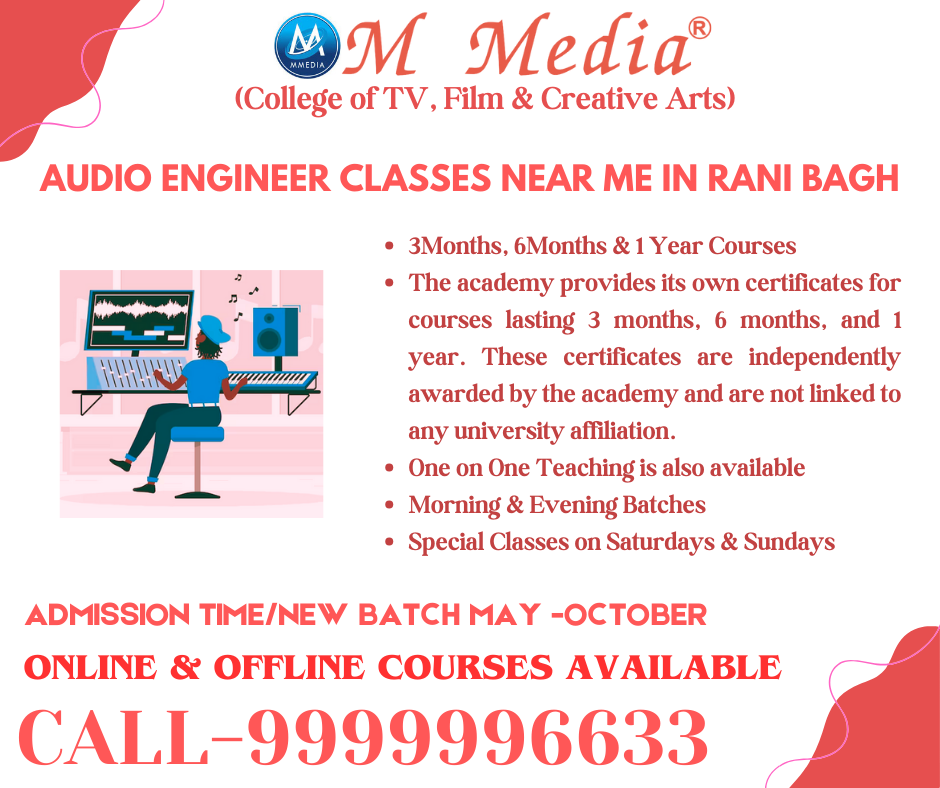
INTRODUCTION:
Audio Engineer Classes Near Me In Rani Bagh are specialised programs that teach students how to manage and manipulate sound in various formats, ranging from music production to film sound design, podcasting, live event sound, and more. These classes provide both theoretical knowledge and practical experience, covering everything from sound theory and acoustics to mastering audio equipment and working with digital audio workstations (DAWs). Audio engineering is a highly technical field, but it also requires a great deal of creativity, and these classes are designed to help students develop both aspects of their skill set.
In audio engineer classes, students will typically learn how to record, mix, and edit audio, handle microphones and audio consoles, create sound effects, and work with various recording mediums. The skills gained through these classes are essential for anyone seeking a career in audio production, whether it’s in music, film, television, gaming, or live events.
IMPORTANCE:
1. Developing Technical Expertise
Audio engineering is a complex and technical field. Successful audio engineers must have a deep understanding of both the technology and the creative side of sound production. Audio engineer classes provide a structured learning environment to acquire this technical knowledge. Whether it’s understanding sound wave behaviour, working with mixing boards, or troubleshooting equipment, these courses give students a firm foundation in the core principles and practices of audio engineering.
2. Keeping Up with Evolving Technology
The world of audio production is rapidly changing, with new tools and technologies emerging regularly. Audio engineer classes ensure that students stay up-to-date with the latest software, equipment, and techniques. This ensures that graduates are prepared to work with the cutting-edge technology used in modern recording studios, concert venues, and multimedia productions.
3. Hands-on Training and Experience
Many audio engineer classes emphasise hands-on experience with industry-standard tools and real-world scenarios. This practical exposure allows students to work directly with mixing consoles, microphones, and DAWs, enabling them to develop confidence and competence. The hands-on nature of these classes is essential for mastering the technical skills needed in professional audio production.
4. Learning from Industry Experts
Instructors of audio engineering classes are often seasoned professionals who have worked in various sectors of the audio industry. By learning from these experts, students gain insight into industry standards, best practices, and the real-world challenges they may face on the job. They also have the opportunity to ask questions, receive personalised feedback, and receive mentorship from established professionals.
5. Encouraging Creativity and Innovation
While audio engineering involves a great deal of technical know-how, it also requires creativity. Audio engineer classes teach students how to blend technical skill with artistic flair, whether it’s mixing music to create a certain mood or designing unique sound effects for a film or video game. Students are encouraged to experiment with different techniques and develop their creative approach to sound engineering.
BENEFITS:
1. Career Opportunities in a Growing Industry
The demand for skilled audio engineers continues to rise, particularly in industries like music, film, television, gaming, and live events. By taking audio engineer classes, you are opening doors to a variety of exciting career opportunities. Graduates can work as sound engineers, audio producers, recording engineers, live sound technicians, and more.
2. Mastery of Industry-Standard Tools
Audio engineer classes provide students with the opportunity to become proficient in industry-standard software and equipment, such as Pro Tools, Logic Pro, and various mixing consoles. Mastery of these tools is a major advantage when seeking employment, as they are used in professional studios and production environments around the world.
3. Building a Strong Portfolio
Throughout their studies, students work on real-world projects that allow them to build a professional portfolio. A well-crafted portfolio is essential when applying for jobs, as it showcases the student’s skills, creativity, and technical ability. For instance, students may record and mix tracks, design sound for short films, or engineer live concerts, all of which can be included in their portfolios.
4. Networking Opportunities
Audio engineer classes provide an excellent opportunity to network with peers, instructors, and industry professionals. These connections can help students find internships, job opportunities, and collaborations in the future. Networking within these classes also helps students stay informed about industry trends and advancements.
5. Increased Earning Potential
Professionals who complete formal training in audio engineering often have higher earning potential compared to those who are self-taught. Employers value the skills and qualifications gained through audio engineer classes, and this can lead to better-paying job opportunities. Furthermore, the versatility of the field allows professionals to work in a wide range of industries, which can increase their chances of career advancement and salary growth.
6. Creative and Personal Fulfillment
For many, audio engineering is not just a career but a passion. These classes offer an outlet for creativity, enabling students to express themselves through sound, whether they’re producing music, working on sound design for films, or managing live sound at concerts. The opportunity to turn a passion for sound into a career brings significant personal satisfaction.
7. Flexibility in Career Paths
Audio engineering is a diverse field with opportunities in various sectors, including music production, film sound, radio, live events, gaming, and even virtual reality (VR) and augmented reality (AR) audio design. Audio engineer classes provide a broad skill set, allowing students to pursue a variety of career paths depending on their interests.
8. Developing Problem-Solving and Critical Thinking Skills
In the world of audio engineering, unexpected challenges arise frequently, whether it’s dealing with equipment malfunctions or solving acoustical issues. Audio engineer classes teach students how to troubleshoot problems efficiently and think critically about the best solutions, which are invaluable skills in any audio engineering role.
9. Hands-On Learning in Real-World Environments
Many programs offer internships, practical workshops, and live projects that allow students to apply their knowledge in real-world environments. This hands-on training not only strengthens technical skills but also helps students learn how to work under pressure, meet deadlines, and collaborate with other professionals.
10. Confidence to Work in Diverse Audio Environments
By the end of their courses, students gain the confidence to handle a wide variety of tasks, whether it’s recording an album, mixing audio for a film, or managing sound at a live event. The training equips them with the skills needed to thrive in different audio engineering environments, making them versatile professionals in the field.


